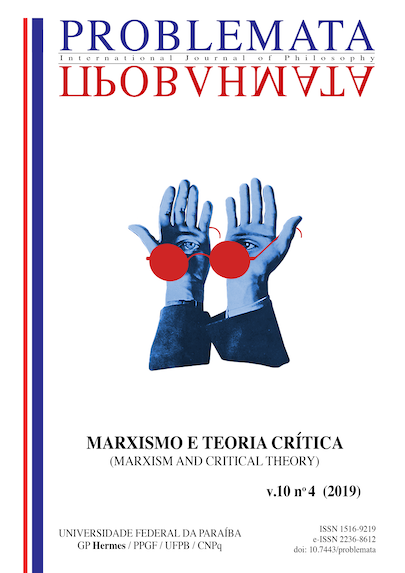LAW FORM EQUAL TO COMMODITY FORM? ON THE PASCHUKANIS METHOD:
THE GENERAL THEORY OF LAW AND MARXISM
DOI:
https://doi.org/10.7443/problemata.v10i4.49709Keywords:
Law form, Commodity form, Civil personAbstract
This article analyzes the relationship established by Paschukanis between the law form and the commodity form. Paschukanis's thesis is that the law form is determined by the commodity form. Precisely for this reason, the social relationship between the possessors of commodities is regulated by the law form. Law then presents itself simply as a form of capitalist domination. The article aims to show the incongruities of this analogy between the commodity form and the law form. Paschukanis presents a concept of law that is reductionist, precisely because it is unaware of its positive aspect, capable of constituting individual free spaces and mediating the relationship between the individual and the social sphere. [Editor’s translation].
Downloads
References
MARX, K. Debatten über die Preßfreiheit. MEW 1. Berlin: Dietz, 1981, p. 28–77.
______. Einleitung [zur Kritik der politischen Ökonomie]. MEW 13. Berlin: Dietz, 1961. S. 615–642.
______. Das Kapital. Kritik der politischen Ökonomie. Erster Band. Buch I: Der Produktionsprozeß des Kapitals. MEW 23. Berlin: Dietz, 1962.
HEGEL, G. W. F. Grundlinien der Philosophie des Rechts oder Naturrecht und Staatswissenschaft im Grundrisse. GW 14. Hamburg: Meiner, 2009.
PASCHUKANIS, E. Allgemeine Rechtslehre und Marxismus. Versuch einer Kritik der juristischen Grundbegriffe. Frankfurt/M., 1970. (Archiv sozialistischer Literatur 3).
Downloads
Published
Issue
Section
License
Authors who publish with this journal agree to the following terms:
- Authors retain copyright and grant the journal right of first publication with the work simultaneously licensed under a Creative Commons Attribution License that allows others to share the work with an acknowledgement of the work's authorship and initial publication in this journal.
- Authors are able to enter into separate, additional contractual arrangements for the non-exclusive distribution of the journal's published version of the work (e.g., post it to an institutional repository or publish it in a book), with an acknowledgement of its initial publication in this journal.
-
- Authors are permitted and encouraged to post their work online (e.g., in institutional repositories or on their website) prior to and during the submission process, as it can lead to productive exchanges, as well as earlier and greater citation of published work (See The Effect of Open Access).





